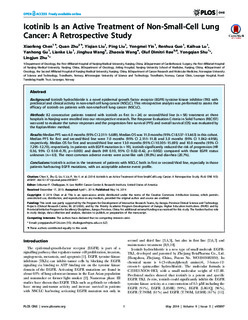| dc.contributor.author | Chen, X | |
| dc.contributor.author | Zhu, Q | |
| dc.contributor.author | Liu, Y | |
| dc.contributor.author | Liu, P | |
| dc.contributor.author | Yin, Y | |
| dc.contributor.author | Guo, R | |
| dc.contributor.author | Lu, K | |
| dc.contributor.author | Gu, Y | |
| dc.contributor.author | Liu, L | |
| dc.contributor.author | Wang, J | |
| dc.contributor.author | Wang, Z | |
| dc.contributor.author | Røe, Oluf Dimitri | |
| dc.contributor.author | Shu, Y | |
| dc.contributor.author | Zhu, L | |
| dc.date.accessioned | 2015-11-24T13:04:33Z | |
| dc.date.accessioned | 2015-12-04T10:12:54Z | |
| dc.date.available | 2015-11-24T13:04:33Z | |
| dc.date.available | 2015-12-04T10:12:54Z | |
| dc.date.issued | 2014 | |
| dc.identifier.citation | PLoS ONE 2014, 9(5) | nb_NO |
| dc.identifier.issn | 1932-6203 | |
| dc.identifier.uri | http://hdl.handle.net/11250/2366943 | |
| dc.description.abstract | Background
Icotinib hydrochloride is a novel epidermal growth factor receptor (EGFR) tyrosine kinase inhibitor (TKI) with preclinical and clinical activity in non-small cell lung cancer (NSCLC). This retrospective analysis was performed to assess the efficacy of icotinib on patients with non-small-cell lung cancer (NSCLC).
Methods
82 consecutive patients treated with icotinib as first (n = 24) or second/third line (n = 58) treatment at three hospitals in Nanjing were enrolled into our retrospective research. The Response Evaluation Criteria in Solid Tumors (RECIST) was used to evaluate the tumor responses and the progression-free survival (PFS) and overall survival (OS) was evaluated by the Kaplan-Meier method.
Results
Median PFS was 4.0 months (95% CI 2.311–5.689). Median OS was 11.0 months (95% CI 8.537–13.463) in this cohort. Median PFS for first and second/third line were 7.0 months (95% CI 2.151–11.8) and 3.0 months (95% CI 1.042–4.958), respectively. Median OS for first and second/third line were 13.0 months (95% CI 10.305–15.695) and 10.0 months (95% CI 7.295–12.70), respectively. In patients with EGFR mutation (n = 19), icotinib significantly reduced the risk of progression (HR 0.36, 95% CI 0.18–0.70, p = 0.003) and death (HR 0.10, 95% CI 0.02–0.42, p = 0.002) compared with those EGFR status unknown (n = 63). The most common adverse events were acne-like rash (39.0%) and diarrhea (20.7%).
Conclusions
Icotinib is active in the treatment of patients with NSCLC both in first or second/third line, especially in those patients harbouring EGFR mutations, with an acceptable adverse event profile. | nb_NO |
| dc.language.iso | eng | nb_NO |
| dc.publisher | Public Library of Science | nb_NO |
| dc.title | Icotinib is an active treatment of non-small-cell lung cancer: A retrospective study | nb_NO |
| dc.type | Journal article | nb_NO |
| dc.type | Peer reviewed | en_GB |
| dc.date.updated | 2015-11-24T13:04:33Z | |
| dc.source.volume | 9 | nb_NO |
| dc.source.journal | PLoS ONE | nb_NO |
| dc.source.issue | 5 | nb_NO |
| dc.identifier.doi | 10.1371/journal.pone.0095897 | |
| dc.identifier.cristin | 1168506 | |
| dc.description.localcode | © 2014 Chen et al. This is an open-access article distributed under the terms of the Creative Commons Attribution License, which permits unrestricted use, distribution, and reproduction in any medium, provided the original author and source are credited. | nb_NO |
